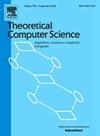随机选择选民选举中的贿赂:硬度和算法
IF 1
4区 计算机科学
Q3 COMPUTER SCIENCE, THEORY & METHODS
引用次数: 0
摘要
计算社会选择的许多研究工作假设选举中有固定的选民,并研究不同的投票规则对选举操纵的抵抗力。然而,近年来,一种被称为随机抽样投票的新技术被用于许多多智能体系统。最突出的例子之一是b区块链。许多基于权益证明的区块链系统,如Algorand,会随机选择系统参与者的一个子集组成一个委员会,只有委员会成员才会参与一些重要系统参数的决策。这可以看作是在选举中随机选择选民委员会(即将被计算选票的选民)。尽管缺乏理论分析,但人们普遍预计,这种随机性的引入应该会使选举更能抵抗选举操纵。在本文中,我们提出了一个系统的研究在选举中随机选择的选民委员会对贿赂的阻力。由于委员会是随机产生的,通过贿赂任何固定的选民子集,指定的候选人可能获胜,也可能不获胜。因此,我们考虑的问题是找到一个可行的解决方案,使指定候选人的获胜概率最大化。我们表明,对于大多数投票规则,这个问题对行贿者来说变得极其困难,因为即使找到任何具有非零目标值的非平凡解也变得np困难。然而,对于复数和否决权,存在一种多项式时间近似方案,可以有效地计算出近似最优解。该算法建立在一个新的整数规划公式和n-fold整数规划技术的基础上,这可能是单独的兴趣。本文章由计算机程序翻译,如有差异,请以英文原文为准。
Bribery in elections with randomly selected voters: Hardness and algorithm
Many research works in computational social choice assume a fixed set of voters in an election and study the resistance of different voting rules against electoral manipulation. In recent years, however, a new technique known as random sample voting has been adopted in many multi-agent systems. One of the most prominent examples is blockchain. Many proof-of-stake based blockchain systems like Algorand will randomly select a subset of participants of the system to form a committee, and only the committee members will be involved in the decision of some important system parameters. This can be viewed as running an election where the voter committee (i.e., the voters whose votes will be counted) is randomly selected. It is generally expected that the introduction of such randomness should make the election more resistant to electoral manipulation, despite the lack of theoretical analysis. In this paper, we present a systematic study on the resistance of an election with a randomly selected voter committee against bribery. Since the committee is randomly generated, by bribing any fixed subset of voters, the designated candidate may or may not win. Consequently, we consider the problem of finding a feasible solution that maximizes the winning probability of the designated candidate. We show that for most voting rules, this problem becomes extremely difficult for the briber as even finding any non-trivial solution with non-zero objective value becomes NP-hard. However, for plurality and veto, there exists a polynomial time approximation scheme that computes a near-optimal solution efficiently. The algorithm builds upon a novel integer programming formulation together with techniques from n-fold integer programming, which may be of separate interest.
求助全文
通过发布文献求助,成功后即可免费获取论文全文。
去求助
来源期刊

Theoretical Computer Science
工程技术-计算机:理论方法
CiteScore
2.60
自引率
18.20%
发文量
471
审稿时长
12.6 months
期刊介绍:
Theoretical Computer Science is mathematical and abstract in spirit, but it derives its motivation from practical and everyday computation. Its aim is to understand the nature of computation and, as a consequence of this understanding, provide more efficient methodologies. All papers introducing or studying mathematical, logic and formal concepts and methods are welcome, provided that their motivation is clearly drawn from the field of computing.
 求助内容:
求助内容: 应助结果提醒方式:
应助结果提醒方式:


